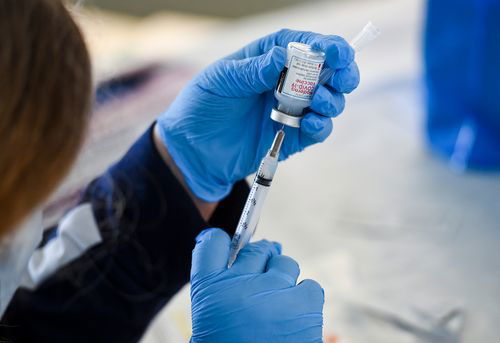To end this pandemic, ‘we’ve got to get everyone in our country vaccinated,’ US surgeon general says

All Americans age 16 and up can now get a Covid-19 vaccine. But the challenge is getting enough people to roll up their sleeves so we can finally quash this pandemic.
“The vaccine is the most important pathway to ending this pandemic. That means we’ve got to get everyone in our country vaccinated,” US Surgeon General Dr. Vivek Murthy said Monday.
“Now what we’ve got to do is No. 1: Get the vaccine. No. 2: Turn around and look at our family and friends and ask if they’re going to get vaccinated. If they need help, that’s what we’ve got to do.”
About 40% of the US population — more than 132 million people — have received at least one dose of the Covid-19 vaccine and about 26% of the population — more than 85 million — are fully vaccinated, according to the Centers for Disease Control and Prevention.
Nearly 212 million doses have been administered in the US, with an average of 3 million shots per day, the CDC said.
It’s critical for those age 16 and up to get vaccinated before new, more contagious strains emerge — just like the B.1.1.7 variant did.
“If we slow down because of (vaccine) hesitancy, it gives more and more time for variants of concern, specifically B.1.1.7 that has ravaged states such as Michigan, to continue to spread and set off potential new surges in local communities,” said epidemiologist Dr. Abdul El-Sayed.
“It has always been a race between the vaccines and the variants. And hesitancy just slows down that vaccine leg.”
The highly contagious B.1.1.7 variant, first spotted in the UK, has been reported in all 50 US states, according to the CDC.
It’s now the dominant coronavirus strain in the US, and young people are at particular risk of getting infected.
‘We’re treating younger patients than we ever saw before’
Despite the rising number of vaccinations, when it comes to young adults, many don’t want to get the shots. And because B.1.1.7 and other strains are spreading among young people, this pandemic could drag on indefinitely if young adults don’t do their part, health experts say.
According to a new Quinnipiac University poll, 36% of adults under the age of 35 said they don’t plan on getting a Covid-19 vaccine.
Dr. Jayne Morgan, clinical director of the Piedmont Healthcare Covid Task Force in Atlanta, said she’s concerned about how the virus is hitting younger groups.
A big part of the country’s 65+ population — which got priority access to vaccine before younger Americans — has already been vaccinated. Now officials are seeing a shift in Covid-19 cases “down to a younger and younger age group,” Morgan said.
“We’ve got to begin to get serious about this,” she said.
CDC Director Dr. Rochelle Walensky also recently said increases in Covid-19 cases and emergency room visits in the US are predominantly among younger adults, “most of whom have not yet been vaccinated.”
Officials in Michigan, which is in the middle of another violent surge, said their hospitals are filling up with younger patients.
“It really is presenting in all of our ERs and frankly in our inpatient units,” Beaumont Health CEO John Fox said.
“We’re treating younger patients than we ever saw before.”
US awaits a decision on the J&J shot
While the US tries to beat variants with vaccinations, doctors await word on the Johnson & Johnson vaccine.
The CDC and the US Food and Drug Administration recommended pausing the Johnson & Johnson vaccine last week after six reported cases of a “rare and severe” type of blood clot, among more than 7.9 million Americans who took the single-dose vaccine.
For those who have received the J&J vaccine within the last three weeks, the risk of developing the rare blood clot would be very low to start with and would decrease over time, the CDC says.
On Monday, the CDC recommended those who experience certain symptoms after being vaccinated with the J&J vaccine seek immediate medical treatment. These include sudden, severe headache, backache, new neurological symptoms, severe abdominal pain, shortness of breath, leg swelling, tiny red spots on the skin, and new or easy bruising.
In Baltimore, the FDA requested Emergent BioSolutions to pause manufacturing the J&J vaccine at a plant after it was found that as many as 15 million potential doses of the J&J vaccine had been spoiled there. Reuters first reported on the decision to halt manufacturing.
Vaccine advisers to the CDC will meet Friday to discuss whether the J&J vaccine may have caused blood clots, and if so, what to do about it.
Dr. Anthony Fauci, director of the National Institute of Allergy and Infectious Diseases, said he expects a decision soon.
“I don’t want to get ahead of the CDC and the FDA and the advisory committee, but I would imagine that what we will see is that it would come back and it would come back in some sort of either warning or restriction,” Fauci said.
“I hope that we don’t see anything extended beyond Friday. We need to get Friday some decision, one way or the other.”
Fauci and other health officials said the pause was important so experts can gather all the necessary data to help inform their decision.
The J&J vaccine was created very differently from the Pfizer/BioNTech and Moderna vaccines.
More than 76 million Americans have been fully vaccinated with the Pfizer/BioNTech or Moderna vaccines, and there have been no known cases of severe blood clots linked to either vaccine.